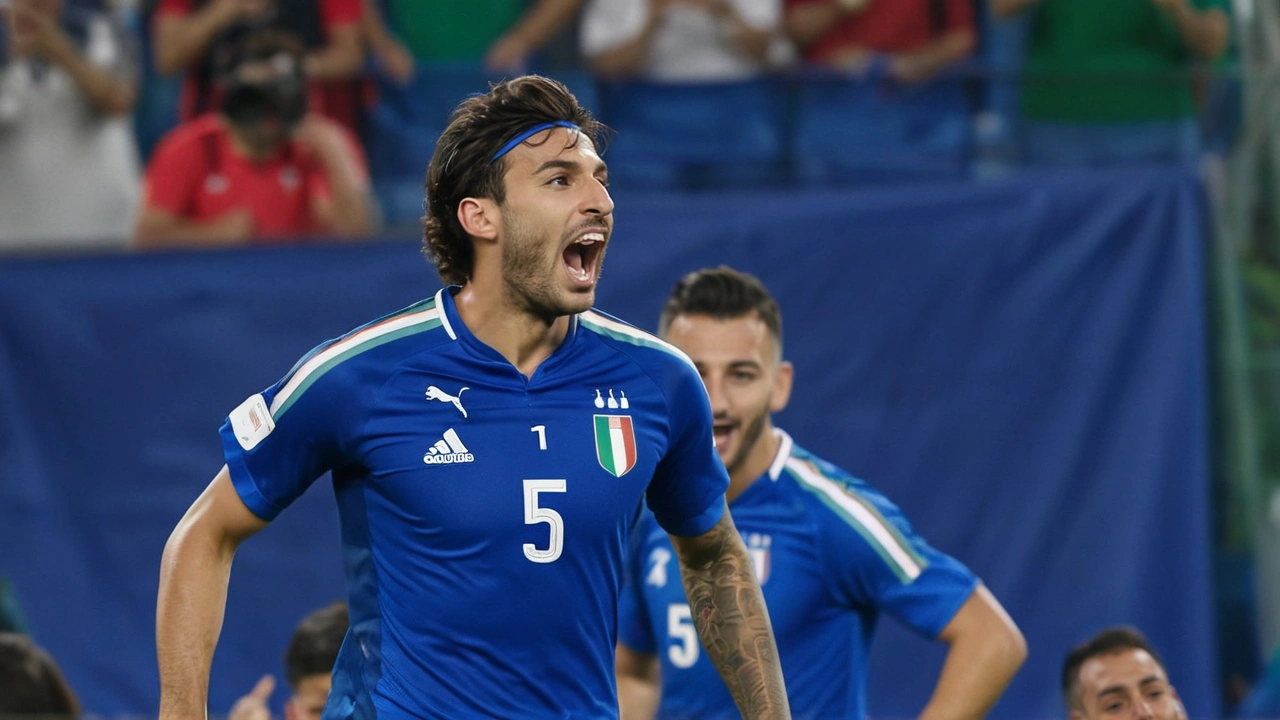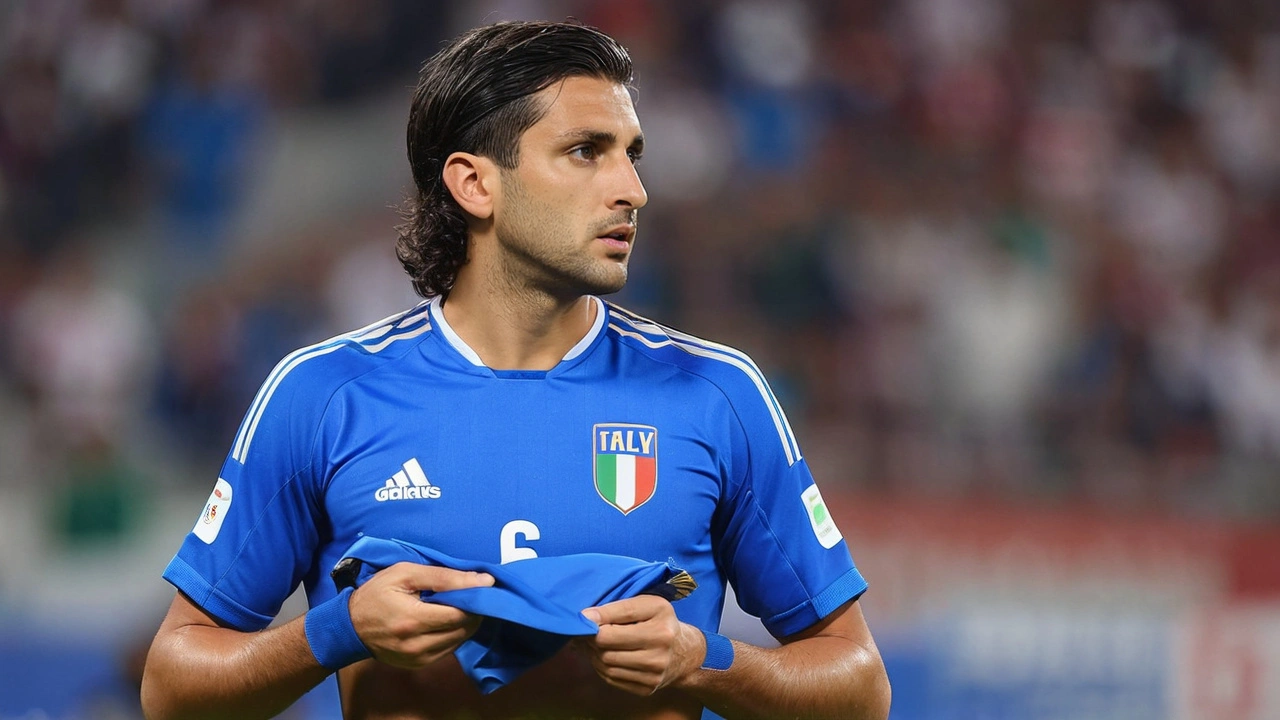Riccardo Calafiori, at just 22 years of age, finds himself in a rather precarious situation following comments he made during a recent interview. The young footballer, who currently wears the Arsenal jersey, openly commended Manchester City's star defender Ruben Dias, asserting that Dias is his preferred defender over other esteemed players such as Virgil van Dijk of Liverpool and Real Madrid’s Antonio Rudiger.
Calafiori’s remarks have not gone unnoticed, and many within the football community are buzzing about the potential repercussions these statements could have on his current club environment. Playing for Arsenal, a team that holds a long-standing rivalry with Manchester City, Calafiori's words might not sit well with his colleagues and the management. The footballing world, known for its intense rivalries and loyal fanbases, does not take such declarations lightly, especially when they come from within club ranks.
Admiring a Rival
It is not unusual for professional players to appreciate the talent of their peers, even if they play for rival teams. However, the timing and nature of Calafiori’s praise for Dias could indeed create ripples. Dias, a central figure in Manchester City’s backline, has been instrumental in their domestic and European successes. His defensive acumen, leadership, and consistency have earned him accolades, and in Calafiori’s eyes, he stands out more than others, including the well-respected Van Dijk and the tenacious Rudiger.
During an open interview, Calafiori did not hold back, highlighting Dias’ positioning, tactical intelligence, and physicality as leading qualities that make him an exceptional defender. This acknowledgment, while honest and professional, may lead to unease in the Arsenal camp. His remarks can be perceived as undermining the capabilities of his own teammates, particularly those in the defense line-up.
Internal Club Dynamics
Inside the grand halls of Arsenal's training grounds, such opinions could fuel discomfort. The Gunners, striving to compete at the highest levels, rely heavily on unity and mutual respect among players. An expression of admiration for a prominent player from a direct competitor might be interpreted as a slight or lack of confidence in the abilities present within. Notably, in a sport where morale and team spirit play a crucial role, such comments have the potential to impact team dynamics adversely.
Calafiori's stance might prompt a critical discussion within the club’s management. The coaching staff, often keen to maintain a cohesive unit, could see this as an opportunity to address any underlying sentiments. An influential statement about an opponent, especially one like Manchester City, could lead to strategic discussions on how to foster a more inclusive and supportive environment where players feel valued and respected equally.
Social Media Reaction
On social media platforms, fans have been vocal about this development. Supporters of Arsenal have expressed mixed feelings, with some admiring Calafiori’s honesty, while others view it as an unnecessary distraction that could have been avoided. Manchester City fans, on the other hand, revel in the acknowledgment of their star defender. Discussions, debates, and memes have flooded the Twitterverse, making the topic trend amongst football enthusiasts.
The response from fans is a testament to the passionate and sometimes divisive nature of football fandoms. For Calafiori, dealing with the aftermath of his statements may also involve managing perceptions. In the current age, where each action and comment is scrutinized under the social media microscope, players often find themselves treading a fine line between personal expression and professional decorum.
Future Implications for Calafiori
As Calafiori looks towards the next steps in his budding career, this incident stands as a reminder of the responsibilities that come with being a public figure in sports. Young athletes often grapple with the balance between candidness and diplomacy. While it is commendable to see them speak freely about their inspirations and experiences, it is equally important for them to navigate these waters carefully, understanding the ramifications their words could have on their career and team relations.
Calafiori’s future at Arsenal, while still promising, now comes with an added layer of curiosity. Will this episode shadow his contributions on the pitch? Or will it fade into oblivion as he continues to deliver stellar performances for Arsenal? Time will reveal the extent to which this matters. For now, the focus for Calafiori will undoubtedly be on reconciling any differences and proving his worth to both his club and fans.

Conclusion
In the world of football, where every word is dissected, Riccardo Calafiori’s admiration for Ruben Dias stands out as a fascinating tale of professional admiration potentially clashing with club loyalties. The young footballer’s future interactions at Arsenal will be seen through this lens, and his journey from this point onwards will be watched with keen interest by fans and pundits alike.
As Calafiori continues to grow and evolve in his career, this incident might just be a footnote in what promises to be an exciting and successful journey. Yet, it serves as a pivotal lesson in the importance of tact in the highly scrutinized world of professional sports.


Comments (7)
The act of lauding an opponent's centre‑back, especially one from a club as dominant as Manchester City, functions as an implicit critique of one's own defensive cohort. In the grand tapestry of football intellect, such acknowledgement may be read as a subtle indictment of Arsenal's lingering tactical naiveté. Calafiori's preference for Dias, therefore, is less an expression of personal admiration than a mirror reflecting systemic inadequacies. One might argue that the young Italian is attempting to align himself with a philosophy of positional rigor that he perceives lacking at the Emirates. It is a quiet rebellion, masquerading as modest flattery, aimed at coaxing his teammates toward a higher standard. While the admiration appears sincere, the subtext suggests an unspoken demand for structural evolution. Ultimately, the discourse reveals more about Arsenal's collective ambition than about Dias's individual prowess.
While I respect the nuanced perspective presented, it is essential to recognize that professional athletes often express genuine admiration independent of intra‑club politics. Such statements can foster cross‑team learning rather than incite dissent, particularly when articulated with decorum. Moreover, the modern football environment encourages openness regarding influences and role models, which may enhance individual development. In this context, Calafiori's commendation of Mr. Dias could be viewed as a constructive gesture rather than a subversive act. Let us therefore consider the broader implications for player growth and tactical exchange. – Thank you for the thoughtful analysis :)
Calafiori’s praise hits the fanbase like a surprise corner kick-caught off guard and forcing everyone to readjust. First off, the defender for City has been a benchmark for ball‑playing centre‑backs for years, and acknowledging that fact is hardly a betrayal. It’s a reminder that talent transcends club colours and that every player, regardless of jersey, deserves respect. Arsenal supporters should channel that energy into demanding higher standards from their own back line instead of whining about a single comment. The real issue lies in how the coaching staff integrates young talents and whether they provide a platform for honest dialogue without fearing backlash. If the locker room is so fragile that a player’s admiration can cause division, then perhaps the internal culture needs reinforcement. Managers must foster an environment where constructive criticism is welcomed, not silenced, because that’s how growth happens. Moreover, the media’s relentless focus on the “controversy” distracts from the on‑pitch work that truly matters-defensive solidity, pressing coordination, and set‑piece execution. Fans should prioritize watching the upcoming fixtures over parsing every interview line for hidden agendas. In this age of instant reaction, we all have a responsibility to temper our instant judgments and look at the bigger picture. A single sentence about Dias does not determine Calafiori’s future at Arsenal; his performances on match day will. Consistency, resilience, and a willingness to learn are the true markers of a rising star. The club’s hierarchy would do well to use this moment as a catalyst for open dialogue, not as a reason to single out a player. Let’s keep the focus on collective improvement rather than policing personal preferences. Finally, remember that football thrives on competition; admiration of a rival’s excellence can elevate the entire league’s quality. So, instead of treating this as a scandal, treat it as an opportunity to raise the bar across the board!!!
Oh sure, because praising a rival defender automatically turns the Arsenal squad into a delicate china shop. Next thing you know, we'll be banning the word “admire” from the stadium.
The whole episode is a textbook case of media sensationalism, exploiting a teenager’s honest opinion for clicks. By framing his comment as a “controversy,” pundits ignore the broader narrative that Arsenal’s defensive frailties are the real story. Calafiori’s personal preference adds nothing to the tactical deficiencies that have plagued the Gunners this season. Fans should redirect their outrage toward the systemic issues rather than a harmless compliment. Ultimately, it’s a distraction that benefits no one.
GooD luck 2 Calafiori
Weighing admiration against institutional decay reveals the absurdity of focusing on minor statements while the club neglects core reforms. The youth’s honesty should be lauded as a beacon, not dimmed by cynical narratives. If the hierarchy embraces such candor, it will signal a shift toward genuine introspection. Let’s champion the truth rather than the noise.